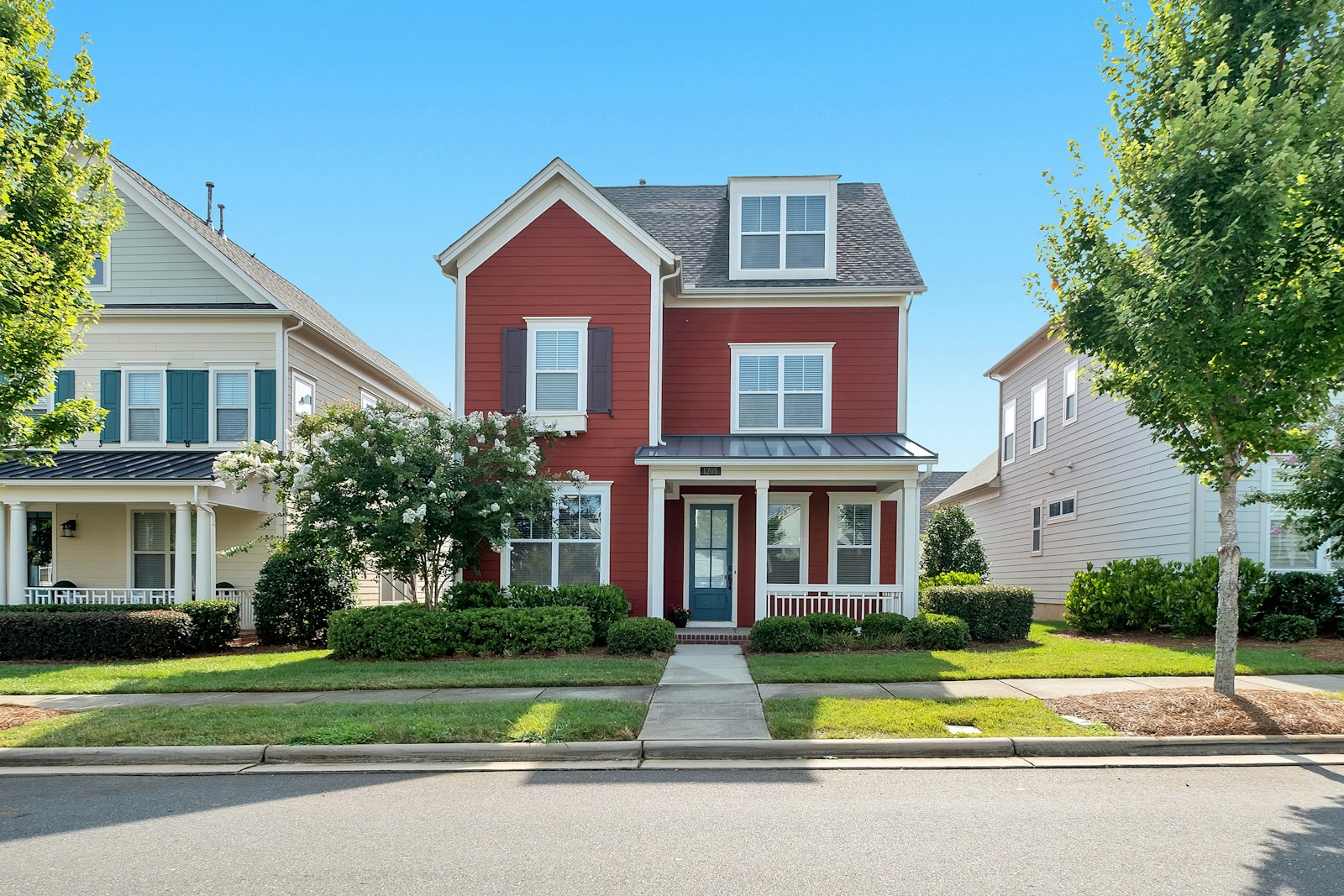There is a lot to think about and do when you are buying a home and this handy little flowchart will give you an excellent and concise overview of what to expect when.

There is a lot to think about and do when you are buying a home and this handy little flowchart will give you an excellent and concise overview of what to expect when.

The process of buying or selling a house seems to involve a million details. It is important that you educate yourself on as many parts of this process as you can—this knowledge could mean the difference of thousands of dollars in the long-run. The legal issues involved in the process are often particularly intricate, ranging from matters of common knowledge to subtle details that might escape the untrained eye. Any of these issues, if not handled properly, could develop into larger problems
With so many legal issues to consider, your first step should be to seek out experienced professionals to help educate you and represent your best legal interests. Begin with an experienced real estate agent, who can help guide you through the initial hoops. S/he should also be able to point you in the direction of a reputable local real estate lawyer to assist you in all legal matters involved in the purchase or sale of your house.
While there are countless legal details involved in a real estate transaction, some seem to pose larger problems than others. We’ve outlined two legal clauses that are commonly misunderstood and may cost you money if not worded correctly. Handle these carefully and you will be on track to a successful sale or purchase!
1. Home Inspection Clause
Some real estate transactions have been sabotaged due to the wording of the home inspection clause. This clause originally allowed that the buyer has the right to withdraw their offer if the home inspection yielded any undesirable results. However, this allowance was known to backfire, as Buyers took advantage of it, using some non-issue stated in the inspection as an excuse for having changed their minds. Of course, this was unfair to the Sellers, as they’d poured time and money into what they believed was a sure deal. Not only might they have missed out on other offers in the interim, but their house might also now be unfairly considered a “problem home.” Additionally, they’d now have to shoulder the costs of continuing to market the property. All of this adds up.
In order to remedy this potential problem, the clause should indicate that the seller has the option of repairing any problems the home inspection might point to. With this slight change in the clause, both buyer and seller are protected.
To ensure this clause is fair from one side of the bargain to the other, work closely with a lawyer experienced in these transactions and all the nuances that may affect the outcome for you.
2. Survey Clause
It is the right of a home buyer to add a survey clause to the real estate contract on the home they’d like to purchase. If you are on the selling end of the contract, be aware.
If you have added an addition or a pool to your property since the last survey was produced, your survey will no longer be considered up-to-date and the Buyer may request that a new one be drawn up—the cost of which you will incur. The price of this process will run anywhere from $700 to $1000.
Your real estate agent has the responsibility to provide you with the most recent survey of your home. It is then the Buyer’s right to decide if it is acceptable. An experienced agent should offer you reliable counsel if you encounter an issue with this clause, but it is advisable to talk to your lawyer if you’re unsure at all of the potential ramifications involved. Remember, the wording of this clause could cost or save you thousands of dollars.

It’s official: you’ve signed the papers, dotted all the i’s and crossed the t’s—you own a new home! You’ve almost reached the end of your journey. However, now, faced with the daunting task of moving, it may seem as though the journey has just begun. Moving can be a time-consuming and stressful experience if you let yourself be overwhelmed by the job. Remember, though, having a successful move means taking care of the details, one by one. If you break the process down into steps and arrange your time accordingly, you can make it manageable. Use the following checklist to ensure you’re covering all the bases, and you will be well on your way to a successful move!
Household
• Arrange to have your mail forwarded to your new address.
• Forward or cease all deliveries to your home, and forward or cancel newspaper and magazine subscriptions.
• Disconnect or take care of utility, cable and phone services and accounts.
• Arrange for utilities to be connected at your new house.
• Cancel pre-authorized bill payments.
• Begin going through closets and discarding any unnecessary items.
Packing
• Plan your packing. Start by purchasing or acquiring suitable containers. Most moving companies have specialized containers you can buy. Also, speak with others who have recently moved—they may be looking to get rid of boxes. You’ll need the following: small boxes for heavy items (books, tools, etc.); large boxes for bulky items (bedding, stuffed toys, etc.); medium boxes for bulky but less heavy items (towels, small appliances, etc.).
• Begin to collect other packing materials. Decide which items you’ll need from the following checklist:
-White paper
-Tissue paper
-Paper towels
-Newspapers
-Non-printed paper
-Packing tape or twine to seal boxes and containers
-Scissors
-Labels and stickers (available from your moving company)
-Felt marker to label boxes
-Notebook and pen for listing contents
• Set goals and deadlines for yourself. Aim, for example, to pack one room per week.
• Attach a list of contents to each box. Separate and label boxes to be placed in storage.
• Consider holding a garage sale to rid yourself of excess belongings.
• Begin to use up the food in your pantry and freezer. Let the food you already have dictate your menus.
• Have rugs cleaned that are to be moved, then roll and wrap them.
• Make special arrangements for the moving of plants or pets.
• Collect all personal items from local services (dry cleaning, storage, photos).
• Service all appliances you are taking with you. Note that all gas appliances must be emptied, as it is illegal for movers to carry flammable substances.
• Take inventory of all the boxes, and contents of the boxes, you have packed.
• Have your car serviced and tuned up.
Community
• Return library books.
• Clean out your locker at any club you are leaving.
• Determine how to transfer your children to a new school.
• Return items you’ve borrowed to friends, and collect any you’ve lent.
• Mail or e-mail change of address notices to family members, friends, and office contacts.
Records
• If needed, transfer medical and dental records, and fill prescriptions.
• Change the address on your driver’s license.
• Change the billing address for credit cards.
• Change the address for banking statements.
• Leave a record of security codes for new tenants.
Insurance and Legal Matters
• Visit your lawyer and ensure all documents are signed.
• Notify your insurance company well in advance of the move and ask them to review your policy.
• Transfer insurance to your new home, or acquire new insurance.
• Review your moving company’s insurance policy. If it doesn’t cover as much as you’d like it to, obtain your own.
• If you are currently renting a house or apartment, give written notice to the landlord.
• Have all keys to your old home delivered to your lawyer or realtor.

The thousands of dollars in rent you’ve already paid to your landlord may be a staggering figure—one you don’t even want to think about. Buying a house just isn’t possible for you right now. And it isn’t in your financial cards for the foreseeable future. Or is it? The situation is common and widespread: countless people feel trapped in home rental, pouring thousands of dollars into a place that will never be their own—yet they think they’re unable to produce a down payment for a home in order to escape this rental cycle. However, putting the buying process into motion isn’t nearly as impossible as it may seem. No matter how dire you believe your financial situation to be, there are several little-known facts that may be key to helping you step from a renter’s rut to homeowning paradise!
Initially, of course, the most daunting factor involved in buying a house is the down payment. You know you’ll be able to handle the monthly payments—you’ve done this for years as a renter. The hurdle, instead, seems to be accumulating the capital needed to put money down. However, this hurdle may be smaller than you think. Take a look at the following points and explore whether any of these scenarios may be possible for you:
1. Find a lender to assist you with your down payment and closing costs.
If you’re free of debt, and own an asset outright, your lending institution may lend you the money for a down payment by securing it against your asset. In this case, you won’t need to have accumulated capital for a down payment.
2. Buy a home even if your credit isn’t top-notch.
If you have saved more than the minimum for a down payment, or can secure the loan against other equity, many lending institutions will still consider you for a mortgage, despite a poor credit rating.
3. Find a seller to assist you in buying and financing the home.
Some sellers may be willing to bear a second mortgage as a seller take-back. The seller then assumes the role of the lending institution, and you pay him/her the monthly payments, rather than paying the price of the home in a lump sum. This is an additional option if you have a poor credit rating.
4. Buy a home with much less down than you’d think.
Investigate local and federal programs, such as first-time buyer programs, that are designed to help people like you break into the housing market. An experienced real estate agent will be equipped to give you all the information you need about these programs, and counsel you on which options are best for you.
5. Create a cash down payment without going into debt.
By borrowing money for specific investments, you may be able to produce a large income tax return that you can use as a down payment. Technically, the money borrowed for these investments is considered a loan, but the monthly payments can be low, and the money you put into both the home and the investments will ultimately be yours.
So, you know there are options out there. The next step is to educate yourself on what your own personal possibilities might be, and how to follow through with the means to achieve these goals. Keep in mind, too, that you can get pre-approved for a mortgage before you begin searching for a home. In fact, you should get pre-approved—the process is free and doesn’t place you under any obligation. You can be pre-approved over the phone. Or, take the next step and complete a credit application. Once a credit application is submitted, you’ll receive a written pre-approval, which will guarantee you a mortgage to a specified level. When you have a concrete price range, you’ll know where to begin looking. Make a commitment to yourself to break out of the renting rut. Start today!

Whether seeking solace, activity, schools, churches, or green space, every homebuyer looks for a different combination of attributes in a new community. Choosing a neighbourhood that suits your needs and wants is one of the most important decisions you’ll make in the home-buying process; your choice of environment will affect the way you experience your new home. This is a very personal decision, influenced by countless unique factors colouring your own lives, but you should always keep the following in mind:
1. If you’re considering buying a home in a community that is unfamiliar to you, get to know its lay-out, offerings, and ambiance. Take some time to walk or drive through the neighbourhood, both during the day and at night, familiarizing yourself with the sights, sounds, and smells.
2. What amenities does the neighbourhood have to offer? Is public transportation readily accessible? Are there schools, churches, parks, or grocery stores within reach? Consider visiting schools in the area if you have children.
3. What is the nature of the job market in the area? Keep in mind that if area employers are producing more jobs, you can expect property values to increase, especially if the jobs offered fall within a higher salary bracket.
4. Speak with the neighbours. Ask questions. They can offer you a wealth of information, from an inside perspective.
5. How will you be affected by a new commute to work? Drive the route between the new neighbourhood and your office during the appropriate times to gauge the volume of traffic you could expect to encounter, and the amount of time you’d need to put aside for daily travel.
6. Contact local land-use and zoning officials to determine existing development plans or potential for development in the area. A strong agenda for neighbourhood planning and local zoning will increase the value and draw of a neighbourhood. Keep in mind that any large, tree-covered area may be a target for future development in popular communities.
7. Determine whether financial resources have been put in place to support infrastructure projects in the area. These construction projects might include building, replacing, or improving anything from schools to roads, and are usually part of a city or town’s long-term plan. While disruptive, construction could also be a benefit to your experience of a community, influencing the long-term value of the area.

The asking prices of most homes on the market indicate the current state of the market, and usually mirror the prices for which other similar homes in the area have recently sold. In deciding upon a selling price, a home-seller must establish a balance between the desire to draw the highest offer and finding a price that will be reasonable enough to attract an appropriate pool of prospects, and competitive offers. While most selling agents counsel their clients to consider this equation when pricing their home, keep in mind that some homes are not properly priced.
It’s important to educate yourself about the current market before approaching the purchase of a home. The market will always influence a property’s value, regardless of the state of a home, or its desirability. Here are the types of market conditions and how they may affect you:
1. Seller’s Market:
A seller’s market is considered a “hot” market. This type of market is created when demand is greater than supply—that is, when the number of buyers exceeds the number of homes on the market. As a result, these homes usually sell very quickly, and there are often multiple offers. As a buyer, you need to consider that many homes will sell above the asking price; in other words, you may have less room to negotiate, and may encounter competing offers. Though most buyers want to get a home for the lowest price possible, reducing your offer could mean opening the door for another buyer instead.
2. Buyer’s Market:
A buyer’s market is a slower market. This type of market occurs when supply is greater than demand, the number of homes exceeding the number of buyers. Properties are more likely to stay on the market for a longer period of time. Fewer offers will come in, and with less frequency. Prices may even decline during this period. As a buyer, you will have more selection and flexibility in terms of negotiating toward a lower price. Even if your initial offered price is too low, the seller will be more likely to come back with a counter-offer, so you can begin the process of negotiation.
3. Balanced Market:
In a balanced market, supply equals demand, the number of homes on the market roughly equal to the number of buyers. When a market is balanced there aren’t any concrete rules guiding whether you should make an offer at the higher end of your range, or the lower end. Prices will be stable, and homes will sell within a reasonable period of time. You will have a decent number of homes to choose from, and may encounter some competition for offers on the home of your choice, or none at all.
Before you make an offer to purchase a home, establish whether the current market is a Buyer’s, Seller’s, or Balanced market. Also, evaluate the price similar properties have sold for in the area, and the length of time these properties spent on the market. Determine how the home you’re considering compares to these other sales. Is this one over-priced, under-priced, or a fair price? By establishing this information prior to making an offer, you will be in a position to negotiate the best price for the home and be prepared for any additional opportunities that may come your way.
Keep in mind, a realtor is trained to provide clients with this information about the market, helping you make the most informed decision possible. The right realtor will guide you through the ups and downs of the market and keep you up-to-date with the types of changes you might expect. These realtor resources and connections will prove to be invaluable as you navigate the real estate market.
The other main factors that affect market value are:
1. Location:
The proximity of the home to amenities, such as schools, parks, public transportation, and stores will affect its status on the market. Also, the quality of neighbourhood planning, and future plans for development and zoning will influence a home’s current market value, as well as the ways in which it might change.
2. Property:
The age, size, layout, style, and quality of construction of the building will all affect a property’s market value, as well as the size, shape, seclusion and landscaping of the yard.
3. Condition of the Home:
This includes the general condition of the home’s main systems, such as the furnace, central air, electrical system, etc., as well as the appearance and condition of the fixtures, the floor plan of the house, and its first appearances.
4. Comparable Properties:
Examine the selling and asking prices of similar homes in the neighbourhood. Ask your Realtor to prepare you a general market analysis of the neighbourhood you’re interested in, so you can determine a range of value for a particular property. A market analysis will provide you with a market overview and give you a glimpse at what other similar properties have been selling for in that area.
5. Market Conditions/ Economy:
The market value of a home is additionally affected by the number of homes currently on the market, the number of people looking to buy property, current mortgage rates, and the condition of the national and local economy.

There is no set equation to determine how you’ll reach an offer price. Rather, the process involves a range of research and comparison that will vary with each situation. You’ll need to look at sales of comparable properties, and factor in additional data such as the condition of the property, the current market, and seller circumstances. With this information in hand, you will be able to determine a fair price range and, from there, establish the price you’re willing to offer.
Concentrate on the following areas to help you determine an offer price:
Comparable Sales
• Compare prices of homes that are similar to the property you’re considering in the following areas: number of bedrooms and bathrooms, square footage, lot size, type of construction, and garage space.
• The most comprehensive and in-depth information can be accessed through the Multiple Listing Service (MLS). Your Realtor, who will be working closely with you to set your offer price, can help you navigate this service.
Property Condition
• Observe how the property compares to the rest of the neighbourhood. Is it average, above average, or below average?
• Look at structural condition: walls, ceilings, windows, floors, doors.
• Pay close attention to: bathrooms, bedrooms, condition of plumbing and electricity.
• Also check the fixtures: light switches, doorknobs, drawer handles, etc.
• What is the condition of the front and back yards?
Home Improvements
• Cosmetic changes can be largely ignored, but any major improvements should be taken into account.
• Take special note of: room additions (especially bedrooms and bathrooms).
• Items such as swimming pools may be taken into account, but usually won’t affect your offer. Your Realtor can offer your guidance in these matters.
Market Conditions
• Seller’s Market:
A seller’s market is considered a “hot” market. This type of market is created when demand is greater than supply—that is, when the number of Buyers exceeds the number of homes on the market. As a result, these homes usually sell very quickly, and there are often multiple offers. Many homes will sell above the asking price.
• Buyer’s Market:
A Buyer’s market is a slower market. This type of market occurs when supply is greater than demand, the number of homes exceeding the number of Buyers. Properties are more likely to stay on the market for a longer period of time. Fewer offers will come in, and with less frequency. Prices may even decline during this period. Buyers will have more selection and flexibility in terms of negotiating toward a lower price. Even if your initial offered price is too low, Sellers will be more likely to come back with a counter-offer.
• Balanced Market:
In a balanced market, supply equals demand, the number of homes on the market roughly equal to the number of Buyers. When a market is balanced there aren’t any concrete rules guiding whether a Buyer should make an offer at the higher end of his/her range, or the lower end. Prices will be stable, and homes will sell within a reasonable period of time. Buyers will have a decent number of homes to choose from, so Sellers may encounter some competition for offers on their home, or none at all.
Comparable sales information helps you establish a price range for the home you’re interested in. Adding in the additional factors mentioned above will guide your decision of whether you consider a “fair” price to be near the upper or lower limit—or the middle—of that range. Keep in mind, this price should be the one you’d be happy with once all negotiations are said and done. The price you decide to begin with depends on your particular style of negotiation. Most Buyers begin the negotiation process with a number lower than the “fair” price they’ve come up with.

Each homebuyer has different ideas of what will constitute the ideal home for them, these notions often based on particular aesthetic preferences. But one thing that unites all potential homebuyers is the desire to find a home that is fundamentally sound—in areas beyond the immediate sweep of the eye—and that will provide a safe, comfortable, and efficient foundation for their life behind a new door.
This is where the services of a home inspector come in. During a home inspection, at least 30 areas of the home are placed under the home inspector’s “microscope.” We’ve compiled the ten most common weaknesses uncovered in a typical home inspection. If not addressed, these problems could cost you thousands of dollars in the long-run. So, knowing what to look for, and performing your own thorough pre-inspection, will help you to identify areas for repair or improvement before they grow into costly problems.
1. Damp Basement:
If a mildew odour is present, the inspector will be able to detect it, as this smell is impossible to mask or eliminate. Mildew odour is often the first indication of dampness in the basement. The inspector will also examine the walls, checking for any signs of whitish mineral deposit just above the floor, and will note whether you feel confident enough to store items on the floor. Repairs can run anywhere from $200 to $15, 000, this cost ultimately influencing the calculation of your home’s value, so consider enlisting the help of an expert to ensure you have a firm grasp on the bottom line before moving forward with the sale of your home.
2. Poorly Installed/ Defective Plumbing:
In older homes, plumbing problems and defects are very common. The inspector will determine whether your home’s plumbing is subject to leaking or clogging. Signs of leakage can be visibly detected. The inspector will test water pressure by turning on all the faucets in the highest bathroom and then flushing the toilet. If the sound of water is audible, this indicates that the home’s pipes may be too narrow. The inspector will also check for signs of discolouration in the water when a faucet is first turned on. The appearance of dirty water is usually an indication that the pipes are rusted—a water quality problem that should be dealt with immediately.
3. Older/ Poorly-Functioning Heating and Cooling Systems:
Heating/ cooling systems that are older or haven’t been properly maintained can pose serious safety and health problems. An inspector will determine the age of your furnace and, if it is over the average life span of a furnace (15-20 years), will likely suggest you replace it, even if it is still in good condition. If your heating system is a forced air gas system, the heat exchanger will be examined very closely, as any cracks can result in the leak of poisonous carbon monoxide gas. These heat exchangers are irreparable; if damaged, they must be replaced. While replacing these components may seem expensive, a new system will yield heightened efficiency, reducing monthly heating/ cooling costs substantially, and benefiting your long-term investment.
4. Older/ Unsafe Electrical System:
In older homes, it is common to find undersized services, aluminum wiring, knob-and-tub wiring, or insufficient/ badly-renovated distribution systems. When an electrical circuit is over-fused, more amperage is drawn on the circuit than what the circuit was intended to bear, creating a fire hazard. You’ll typically find a 15 amp circuit in a home, with increased service for larger appliances such as dryers or stoves. If replacing your fuse panel with a circuit panel, expect a cost of several hundred dollars.
5. Older/ Leaking Roof:
An asphalt roof will last an average of 15 to 20 years. Leaks through the roof could be a sign of physical deterioration of the asphalt shingles caused by aging, or could indicate mechanical damage caused by any number of factors, such as a heavy storm. If you decide your roof requires new shingles, you’ll first need to know how many layers are beneath, in order to determine whether the roof must be completely stripped before installing the new shingles.
6. Minor Structural Problems:
Common in older homes, these problems range from cracked plaster to small shifts in the foundation. While this variety of problem isn’t large enough to cause any real catastrophe, they should be taken care of before they grow.
7. Poor Ventilation:
Unvented bathrooms and cooking areas can become breeding areas for mold and fungus, which, in turn, lead to air quality issues throughout the house, triggering allergic reactions. Mold may additionally cause damage to plaster and window frames. These problems should be identified and taken care of before any permanent damage is caused.
8. Air Leakage:
A cold, drafty home can be the result of any number of problems, such as illfitting doors, aged caulking, low-quality weather strips, or poor attic seals. This nature of repair can usually be taken care of easily and inexpensively.
9. Security Features:
An inspector will look at the standard security features that protect your home, such as the types of lock on the doors/ windows/ patio doors, and the smoke or carbon monoxide detectors and where they’re located throughout the home. Check with an expert if your home is lacking in any of these areas, in order to determine what costs to expect.
10. Drainage/ Grading Problems:
This may be the most common problem found by home inspectors, and is a widespread catalyst of damp and mildewed basements. Solutions to this problem may range from the installation of new gutters and downspouts, to re-grading the lawn and surrounding property in order to direct water away from the house.

Finding a real estate agent who is right for you requires doing a little homework, and asking the right questions. Choosing an agent is a decision that could ultimately cost or save you thousands of dollars. Keep in mind the individual you choose will be handling almost every maneuver in the biggest financial investment of your life. Experience, interests, and expertise vary from agent to agent, so you should be asking very specific questions in order to align your own needs with the abilities of an appropriate representative. Use the following list of questions as a guide to finding the agent that is right for you:
1. How long have you been involved in residential real estate in this area?
If the agent hasn’t been connected to the residential real estate market for several years, s/he will be out of touch with the cyclical nature of the current market. Your agent must be familiar with trends of the local market and have an eye for the ways in which it will change. This knowledge could mean the difference of thousands of dollars in the long-run.
2. What is your marketing strategy for my home?
A realtor should be able to lay out for you, in detail, a marketing plan to sell your home. Examine this plan carefully. How much money does the realtor allot to advertising? What type of media does s/he use? S/he should be able to demonstrate the effectiveness of one form of media over another, explaining why his/her particular marketing strategy will sell your home faster and for top dollar. The realtor should employ current, innovative marketing techniques that indicate creativity and a willingness to market outside of the box. Stay away from realtors who rely on traditional, dated forms of advertising. They simply won’t work in the current real estate market.
3. How do you support a buyer throughout the process?
A realtor should be able to indicate how s/he will support you through each step of the home-buying or selling process, offering you a unique system to suit your needs and goals. Also, ask if a specialist will be available at each level of the sale. Your realtor should always be on hand to answer questions, but the specific resources of an expert can be invaluable during different stages of the process.
4. What other properties has your company sold in my area?
The realtor should be able to provide you with a complete, detailed listing of their own sales in your area, as well as other comparable sales. You should get a clear idea of what you might be able to expect both from the realtor and from the current market.
5. What is your experience with financing options? How would you suggest I approach my own financing plan?
Each buyer requires a different financing strategy. A realtor should be able to suggest a plan catered specifically to your financial background and needs. Don’t just depend on your lender for information and guidance on financing a new home. Let your agent lead the way.
6. On average, how close is the selling price of your listings to their asking price, and how long do they take to sell?
You can contact the Real Estate Board to obtain information on the selling record of an agent. The Board also has statistics on a broader scale, so you can see whether an agent’s selling performance is higher or lower than the board average, and whether s/he tends to sell faster or slower than the board average. Placing the realtor’s performance on a scale will help you get an idea of how much you might expect your home to sell for, and how long it might take to sell.
7. What is your philosophy/method of negotiation and how will you apply it when selling my home?
Your realtor should be able to articulate effective and informed negotiation tactics that demonstrate a commitment to securing the best price for you.
8. Do you have a reference list of clients I could contact?
Do some homework! Choose a few names on the list and call them. The stories of others who have gone through the home-selling process can be a valuable source of information

Budgeting for a new home can be tricky. Not only are there mortgage installments and the down payment to consider, there are a host of other—sometimes unexpected— expenses to add to the equation. The last thing you want is to be caught financially unprepared, blindsided by taxes and other hidden costs on closing day.
These expenses vary: some of them are one-time costs, while others will take the form of monthly or yearly installments. Some may not even apply to your particular case. But it’s best to educate yourself about all the possibilities, so you will be prepared for any situation, armed with the knowledge to budget accordingly for your move. Use the following list to determine which costs will apply to your situation prior to structuring your budget:
1. Purchase offer deposit.
2. Inspection by certified building inspector.
3. Appraisal fee:
Your lending institution may request an appraisal of the property. The cost of this appraisal is your responsibility.
4. Survey fee:
If the home you’re purchasing is a resale (as opposed to a newly built home), your lending institution may request an updated property survey. The cost for this survey will be your responsibility and will range from $700 to $1000.
5. Mortgage application at your lending institution.
6. 5% GST: this fee applies to newly built homes only, or existing homes that have recently undergone extensive renovations.
7. Legal fees:
A lawyer should be involved in every real estate transaction to review all paperwork. Experience and rates offered by lawyers range quite a bit, so shop around before you hire.
8. Homeowner’s insurance:
Your home will serve as security against your loan for your financial institution. You will be required to buy insurance in an amount equal to or greater than the mortgage loan.
9. Land transfer (purchase) tax:
This tax applies in any situation in which a property changes owners and can vary greatly.
10. Moving expenses.
11. Service charges:
Any utilities you arrange for at your new home, such as cable or telephone, may come with an installation fee.
12. Interest adjustments.
13. Renovation of new home:
In order to “make it their own,” many new homeowners like to paint or invest in other renovations prior to or upon moving in to their new home. If this is your plan, budget accordingly.
14. Maintenance fees:
If you are moving to a new condominium, you will likely be charged a monthly condo fee which covers the costs of common area maintenance.

If you are considering looking for a new house, and are a current home-owner, then chances are you’re wondering what your strategy should be: do you wait to find the perfect new home before you put your current home on the market, or do you sell first and then look around? You have a few options. Use the following as a guide to explore what might be the best move for you.
Sell First:
There are several benefits to selling your current house before searching for your next home. First of all, once you have sold your house, you will know precisely how much money you have to work with. With a concrete price range, you’ll be able to narrow the pool of houses before you begin looking, and negotiate accordingly. This will allow you to immediately make firm offers on houses that you are serious about purchasing. You can be first in line with an unconditional offer you know you can afford, and this will grant even further negotiating leverage as Sellers tend to take unconditional offers more seriously. When they counter or turn down an offer that’s conditional on the sale of a home, they usually think the Buyer will come back with a better and more firm offer once they have sold their current home. However, if you make an unconditional offer, the Seller will usually give you more consideration, as they realize you’re probably looking at other properties and will move on if your offer is rejected. Likewise, if you have already sold you house, you probably do have a wider opportunity to look around, negotiate, and find the best deal and fit for you and your family.
The flip side of this scenario, however, is that if you don’t find the right property before the closing date of the house you’ve already sold, you may have to look for temporary housing until you do find what you’re looking for.
So, before you opt to sell first, you should determine whether you have alternate, temporary options, in case you have to move from your house before you’ve found a new one. How would you and your family deal with living in a transition home for an undetermined period of time?
Buy First:
Buying a new house without having sold your current home may occur if you are interested in a specific property and will only sell your current home if this property comes on the market. It may be a matter of timing—grabbing hold of the home before it’s too late. The same might be said of a property you haven’t had you eye on previously, but that catches your attention due to its uniqueness or unbelievable price. If buying first means you don’t miss out on the real estate opportunity of a lifetime, it may be the best move.
However, be careful. If you buy another property and aren’t able to sell your current home quickly enough, you could end up having to finance both homes and shoulder the extra debt until you sell. You can get a financial appraisal or market evaluation of a home prior to selling, but this doesn’t guarantee the price you’ll ultimately receive for the home after the negotiation process has run its course. Since your selling price will be an unknown, jumping into a purchase could be a gamble, particularly if your budget is tight.
Make sure you’re familiar with all aspects of the financial reality this scenario would create before you purchase another home. You may be faced with owning two homes at once. What type of financial stress would this bring to your life and how would you deal with it? Consider the fact that if your current house doesn’t sell quickly enough, you may be forced to sell it off at a reduced price in order align the closing dates of your two properties. What effect would this have on your financial situation?
Conditional Offer:
An additional option involves making your offer to purchase conditional upon the sale of your current property within a specified period. Conditional offers usually include a clause that allows for the Sellers to keep their property on the market and remain open to other offers while you try to sell your home. If the Sellers receive another attractive offer before you’ve sold your home, they may accept and ask you to either remove your condition and firm up your offer, or to back down from the offer. A conditional offer forms a kind of middle ground, an area of compromise, for those who are afraid to sell or buy first—but doesn’t hold the advantages of the other two options.
One of the drawbacks of the conditional offer is that Sellers tend to take them less seriously. They definitely give stronger consideration to firm offers. This leaves you with less negotiating power. In fact, some Sellers will simply turn down or counter a conditional offer. Other Sellers will believe the Buyer will come back with a more serious offer when their home has sold. So, you may end up having to increase your offer in order to have your conditional offer accepted and keep your foot in the door of your desired house.
Even if your conditional offer is accepted, there is no guarantee another Buyer won’t step in and overthrow your offer before you have sold your current home, which would put you back at the starting line. Also, consider the fact that you cannot withdraw your conditional offer until the end of the period specified in the contract—which means that if a better deal comes along, you will have to wait to jump at it.

You’ve been saving for awhile, weighing your options, looking around casually. Now you’ve finally decided to do it—you’re ready to buy a house. The process of buying a new home can be incredibly exciting, yet stressful, all at once. Where do you start?
It is essential you do your homework before you begin. Learn from the experiences of others, do some research. Of course, with so many details involved, slip-ups are inevitable. But be careful: learning from your mistakes may prove costly. Use the following list of pitfalls as a guide to help you avoid the most common mistakes.
1. Searching for houses without getting pre-approved by a lender:
Do not mistake pre-approval by a lender with pre-qualification. Pre-qualification, the first step toward being pre-approved, will point you in the right direction, giving you an idea of the price range of houses you can comfortably afford. Preapproval, however, means you become a cash buyer, making negotiations with the seller much easier.
2. Allowing “first impressions” to overly influence your decision:
The first impression of a home has been cited as the single most influential factor guiding many purchasers’ choice to buy. Make a conscious decision beforehand to examine a home as objectively as you can. Don’t let the current owners’ style or lifestyle sway your judgment. Beneath the bad décor or messy rooms, these homes may actually suit your needs and offer you a structurally sound base with which to work. Likewise, don’t jump at a home simply because the walls are painted your favourite colour! Make sure you thoroughly the investigate the structure beneath the paint before you come to any serious decisions.
3. Failing to have the home inspected before you buy:
Buying a home is a major financial decision that is often made after having spent very little time on the property itself. A home inspection performed by a competent company will help you enter the negotiation process with eyes wide open, offering you added reassurance that the choice you’re making is a sound one, or alerting you to underlying problems that could cost you significant money in both the short and long-run. Your Realtor can suggest reputable home inspection companies for you to consider and will ensure the appropriate clause is entered into your contract.
4. Not knowing and understanding your rights and obligations as listed in the Offer to Purchase:
Make it a priority to know your rights and obligations inside and out. A lack of understanding about your obligations may, at the very least, cause friction between yourself and the people with whom you are about to enter the contract. Wrong assumptions, poorly written/ incomprehensible/ missing clauses, or a lack of awareness of how the clauses apply to the purchase, could also contribute to increased costs. These problems may even lead to a void contract. So, take the time to go through the contract with a fine-tooth comb, making use of the resources and knowledge offered by your Realtor and lawyer. With their assistance, ensure you thoroughly understand every component of the contract, and are able to fulfill your contractual obligations.
5. Making an offer based on the asking price, not the market value:
Ask your Realtor for a current Comparative Market Analysis. This will provide you with the information necessary to gauge the market value of a home, and will help you avoid over-paying. What have other similar homes sold for in the area and how long were they on the market? What is the difference between their asking and selling prices? Is the home you’re looking at under-priced, overpriced, or fair value? The seller receives a Comparative Market Analysis before deciding upon an asking price, so make sure you have all the same information at your fingertips.
6. Failing to familiarize yourself with the neighbourhood before buying:
Check out the neighbourhood you’re considering, and ask around. What amenities does the area have to offer? Are there schools, churches, parks, or grocery stores within reach? Consider visiting schools in the area if you have children. How will you be affected by a new commute to work? Are there infrastructure projects in development? All of these factors will influence the way you experience your new home, so ensure you’re well-acquainted with the surrounding area before purchasing.
7. Not looking for home insurance until you are about to move:
If you wait until the last minute, you’ll be rushed to find an insurance policy that’s the ideal fit for you. Make sure you give yourself enough time to shop around in order to get the best deal.
8. Not recognizing different styles and strategies of negotiation:
Many buyers think that the way to negotiate their way to a fair price is by offering low. However, in reality this strategy may actually result in the seller becoming more inflexible, polarizing negotiations. Employ the knowledge and skills of an experienced realtor. S/he will know what strategies of negotiation will prove most effective for your particular situation.
Introducing Terry Mitterer, your trusted Realtor, who turns your real estate dreams into reality. With Terry, conquer hurdles, win negotiations, and minimize stress. Your best interests are top priority as Terry expertly guides you to achieve your goals. Choose Terry Mitterer for an extraordinary real estate experience!
![]() The data relating to real estate on this website comes in part from the MLS® Reciprocity program of either the Real Estate Board of Greater Vancouver (REBGV), the Fraser Valley Real Estate Board (FVREB) or the Chilliwack and District Real Estate Board (CADREB). Real estate listings held by participating real estate firms are marked with the MLS® logo and detailed information about the listing includes the name of the listing agent. This representation is based in whole or part on data generated by either the REBGV, the FVREB or the CADREB which assumes no responsibility for its accuracy. The materials contained on this page may not be reproduced without the express written consent of either the REBGV, the FVREB or the CADREB.
The data relating to real estate on this website comes in part from the MLS® Reciprocity program of either the Real Estate Board of Greater Vancouver (REBGV), the Fraser Valley Real Estate Board (FVREB) or the Chilliwack and District Real Estate Board (CADREB). Real estate listings held by participating real estate firms are marked with the MLS® logo and detailed information about the listing includes the name of the listing agent. This representation is based in whole or part on data generated by either the REBGV, the FVREB or the CADREB which assumes no responsibility for its accuracy. The materials contained on this page may not be reproduced without the express written consent of either the REBGV, the FVREB or the CADREB.
©Copyright 2023 Terry Mitterer. All rights reserved. | Privacy Policy | Powered by myRealPage